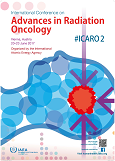Speaker
Alkhansa Mahmoud
(Sudan Atomic Energy Commission)
Description
Introduction: Breast cancer is a common type of cancers among women; it is a heterogeneous disease lead to cause morbidity and mortality. Role of insulin in breast cancer etiology and prognosis has received attention. Insulin is an important hormone that controls blood sugar, fat and protein metabolism. Insulin release has reported to decrease with increasing age. However, age is considering the strongest risk factor for breast cancer after gender. Aim of this study to determine the age and serum insulin levels in breast cancer women and healthy women among Sudanese subjects.
Methods: 130 newly diagnosed breast cancer women selected randomly in age range between 20-80 years, and 109 normal women in same age range as control. Population study classified to six age groups as (20-29),(30-39),(40-49),(50-59),(60-69)and ≥70 years . Excluding criteria includes diabetes, hypertension, heart diseases, thyroid diseases and fertility disorders. Information from questionnaire for patients and control group include dietary habits and physical activity. Insulin level measured by using radioimmunoassay, the normal range of insulin serum level is 4.0-16.8 mIU/L.
Results:
Insulin serum levels were normal in two age groups of (60-69) and ≥70 years for breast cancer patients. Elevation of insulin levels in breast cancer patients observed in age group of (20-29) years and decline seem to be constant in age groups of (30-39), (40-49) and (50- 59) years. All breast cancer patients were lake physical activity and low nutrients intake. Among control groups, the normal levels of insulin observed in two age groups of (20-29) and ≥70 years, insulin levels were normal in young women have physical activity and good nutrition. Women in old age ≥70 years have normal levels of insulin due to physiology of elderly such as menopause or β cell function. While, serum insulin levels elevated gradually in age groups of (30-39), (40-49) and (50- 59) years , and then decline in age group of (60-69) years , serum insulin levels were elevated with age increasing due to the nature of work, a lot of responsibilities and stress in these age stages. All these factors lead to low exercise activities and poor habits dietary. The mean levels of insulin among breast cancer women and healthy women explain in figure1.
Figure 1: Insulin levels in different age groups among study population
Conclusion:
Elevation of serum insulin levels observed in both breast cancer women and healthy women,these results not support that high serum insulin level is directly associated to breast cancer; further studies need to clarify whether cases of high insulin levels enhance cell proliferation and associated to breast cancer etiology.
Constant of insulin levels in age range between 30-59 years in newly diagnosis breast cancer that may link positively to hypoxia, and then after therapy the concentrations of insulin in blood circulation may increase significantly with acute hypoxia. This findings suggest that, future studies recommended to explain the association between hyperinsulinemia and hypoxia intermediated with nutrient agents like trace elements, especially those are affect insulin levels as chromium, zinc, copper and selenium, beside others minerals as iron.
Pharmacology should be considered for hyperinsulinemia to improve outcome of radiotherapy for breast cancer patients, and to protect the women having high insulin levels from breast cancer development. Several factors may increase breast cancer risk by affecting insulin levels combined to lifestyle factors include lacking physical activity and poor nutrition. It is important to care with health in all ages of life.
| Institution | Sudan Atomic Energy Commission |
|---|---|
| Country | Sudan |
Author
Alkhansa Mahmoud
(Sudan Atomic Energy Commission)
Co-author
Khalid Bakheit
(Khartoum University- Faculty of Medicin)

